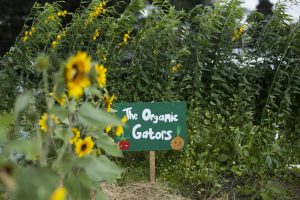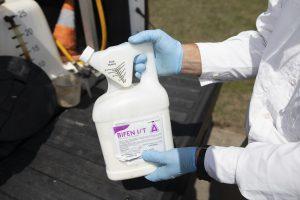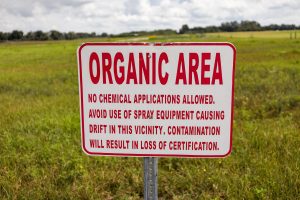Hello Avid Readers! Welcome back and Happy New Year! We are starting the year with a topic that comes up often. Have you ever been asked, does organic mean safe? As an entomologist, I have been asked this often, or heard it stated as a fact. Today I will share what I tend to include in my response and help you understand if organic means safe.

What does Organic Mean?
The word organic alone means, “of, relating to, or derived from living organisms”. That seems pretty straightforward, right? It gets a little more complicated when we start to consider agriculture and pesticides. If something is labeled “Organic” by the USDA, it indicates the following standards have been followed, “..methods integrate cultural, biological and mechanical practices that foster cycling of resources, promote ecological balance and conserve biodiversity. Synthetic fertilizers, sewage sludge, irradiation and genetic engineering may not be used”. For more on the USDA standards check here. I take this to mean that organic agriculture considers as many of the inputs and outputs of a system as possible to make sure the environment is preserved.
Organic pesticides are those that can be used while maintaining the USDA “organic” label. They can be defined as pesticides that are of animal, vegetable, or mineral origin. These pesticides tend to break down quickly when compared to alternatives.

What is the Alternative to Organic?
The alternative to organic pesticides would be synthetic or conventional pesticides. Synthetic pesticides are defined by the USDA as “a substance that is formulated or manufactured by chemical processes, or that chemically changes a substance extracted from a plant, animal, or mineral”. So, something we altered drastically or created as opposed to harvesting from nature. When this type of pesticide is used in agriculture it is termed conventional agriculture as opposed to organic. Either type of agriculture could still follow the basic tenants of integrated pest management like incorporating mechanical and biological control with pesticide use.
Does Organic Mean Safe?
You’ve made it this far so I’ll give you the answer, No. Why is that? Organic pesticides can still be highly toxic to humans and other nontarget organisms. The pesticide label will always have a “signal word” which indicates the level of toxicity. Some organic pesticides have the lowest label of CAUTION. However, others have the signal word DANGER, which means the product is highly toxic. In the same line of thought, synthetic pesticides are not all dangerous. Some have CAUTION on the label while others have DANGER. Overall, just because a pesticide is organic doesn’t inherently mean it’s safe.

Pros and Cons
Organic pesticides are often less persistent than synthetic pesticides. Thus, they are going to break down in the environment which is a pro as far as nontarget effects go. They can also be very specific, like Bt, which can target a specific order of insect pests, while presenting no harm to others. This is an advantage for protecting beneficial organisms in the agroecosystem. However, since they break down faster, if pest problems continue, they may need to be applied more often. This could get expensive for growers.
Synthetic pesticides are usually cheaper but last longer in the environment. This persistence means they may be applied less often but are now a concern for nontargets over a longer period of time. Additionally, there may be more restrictions on harvesting to protect consumers. It is important to note that both synthetic and organic pesticides can fall under the “broad spectrum” category meaning they may harm beneficial organisms. There is a lot of variety in both types of pesticide products.
Summary
There are many considerations that go into pest management. Choosing between organic and synthetic are one of them. I hope today’s blog helped clarify the differences between organic and synthetic pesticides and why one may be chosen over the other. The big take away is that the label will indicate how toxic a pesticide is. Following the instructions and precautions on pesticide labels will dictate how safe they are for humans and the environment.

Resources
The American Heritage® Dictionary of the English Language, 5th Edition
https://www.ams.usda.gov/services/organic-certification/organic-basics
Organic vs. Conventional (Synthetic) Pesticides: Advantages and Disadvantages
 2
2
